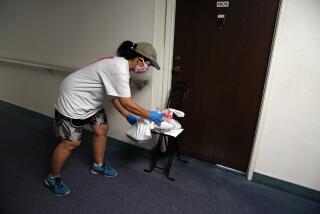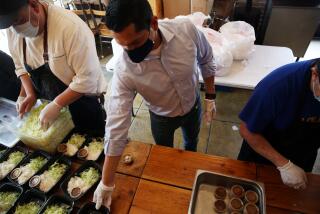Low-Income Seniors Due for a Bigger Harvest
- Share via
ALBANY, N.Y. — For Mary Zion and many senior citizens like her, the bounty of summer is both a taste treat and a nutritional boon.
For years, the 66-year-old from Syracuse, N.Y., has participated in a program in which she has redeemed coupons at local farmers’ markets for fresh fruits and vegetables. Thanks to $10 million in U.S. Department of Agriculture funds, Zion and other low-income seniors will be able to buy more than twice as much fresh produce through the farmers’ market program in 2001 than in past years.
“I come from a farming background, and I know fresh fruit is much better than stuff you buy in the grocery store,” she said.
She also knows that many seniors go without fresh produce or don’t eat as much as they should because they can’t afford it. The infusion of money from Washington into the farmers’ market program will help ease that problem this year. Seniors eligible for $8 in coupons in past years when the program was funded only by New York state will get $20 this summer.
“That would be a godsend to many, many people,” Zion said.
In announcing the $10-million program for 2001, President Clinton had said last November it will be especially useful because most farmers’ markets do not accept food stamps, leaving low-income Americans with few ways to get fresh food.
New York is due $1.5 million under the federal program. It will allow the Senior Farmers’ Market Nutrition Pilot Program, previously serving about 6,000 low-income seniors in New York, to be available to up to 75,000 seniors this year.
To be eligible, applicants must be at least 60 years old and have a household income of no more than 150% of the federal poverty level.
Even with the expansion, advocates for senior citizens in New York say they could probably hand out vouchers to 10 times more seniors who would qualify for the produce program.
In New York, the state Department of Agriculture and Markets is sending out packets with the vouchers and information on participating farmers’ markets to county offices for the aged, according to Jessica Chittenden, a spokeswoman.
It will be up to those county agencies to reach senior centers and groups that are in contact with older New Yorkers to publicize the expanded nutrition program, Chittenden said.
She said the vouchers will be handed out on a first-come, first-served basis.
Greg Olsen of the Statewide Senior Action Council in Albany said the checks are redeemed at the “astronomical” rate of 95% or greater, indicating the popularity of the nutrition program.
Zion agreed. “I’ve never seen any coupon go to waste,” she said.
Nancy Maynard, aging services specialist for Clinton County, N.Y., along the U.S.-Canada border, said about 80 households have received coupons under the state-funded program during the last four years.
This year, she plans to distribute coupons to 360 households with eligible seniors. Maynard said she targets seniors who live in centers with 100 or more residents because she finds they often do not have access to fresh fruit and vegetables.
“The produce grown locally and sold in a farmers’ market is of a higher quality than you might find in a supermarket,” Maynard said. “It is fresh produce at its best. It’s not been sitting on a tractor trailer or in a warehouse or in a truck for a long period of time.”
There are a variety of reasons many older people do not eat enough fresh fruit and vegetables, and unquestioned health benefits for those who do, according to Dr. Lyn Howard, who is in charge of clinical nutrition at Albany Medical Center.
She said well-known studies have compared older Seventh Day Adventists, a Christian sect whose members are vegetarians, and senior citizens in the population as a whole. They have found the Seventh Day Adventists showed much lower rates of constipation and lower blood cholesterol levels, Howard said.
“We all know what the health benefit is from vegetables and fresh produce on a person’s nutrition,” Olsen said. “That’s especially true for senior citizens.”
More to Read
Sign up for Essential California
The most important California stories and recommendations in your inbox every morning.
You may occasionally receive promotional content from the Los Angeles Times.










